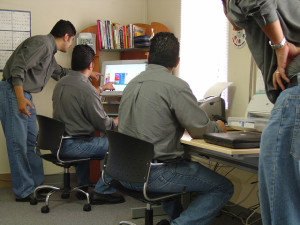Since publishers pay authors twice a year, I have gotten a J.O.B. I like it, but the social learning is ramped up. Fortunately, I have coworkers who tell me how to navigate some of the social mores.
1. Like others and they will like you
It takes effort to like someone, but positive attitude toward others is important. For example, find something to like in every person you work with, even if they have some qualities you don’t like.
2. To tell or not to tell
I have chosen to not reveal that I have autism. Even when a coworker commented that on of the customers must have autism because of his process type of thinking and asking for literal explanations, I just nodded my head.
People have assumptions about autism including that they view autistic people as having a lower IQ. And, I don’t want to hear yet again, “You don’t look like you have autism.”
I have an autism awareness magnet on the back of my truck, so if a coworker ever asked about it, I would say, “Autism runs in my family.”
3. Learn body language
Yes, observe from others, but also observe how you display your own. Here is a TED talk on body language that is illuminating. At work, my boss told me that more than 50% of communication is body language. Tone of voice is second, and the third, what you say, is a small portion.
So, learn how you want to communicate and what others are communicating. I found this handy dandy article with brief lessons.
4. Eye contact Â
Sometimes what I do is look at people between their eyebrows, so it still looks I am making eye contact, without the visual distraction of someone’s eyes. I have been practicing looking then looking away. If I am taking notes or viewing a manual while interacting with a coworker, I look at the paper, with only a short look at her face, which can appear normal.
5. CYA
I had made a mistake, so my boss told me to CYA. It is an acronym for “cover your ass.” My notes on a customer’s file were usually too blunt, so I had to write out more about who told me what, what I did with the customer, the customer’s issues, customer’s feelings, etc., so I wouldn’t get blamed.
6. Avoid gossip
This fantastic little article says a lot about how to get along. Avoiding gossip is worth noting.
Gossip is almost always negative. Say nothing and get back to work.
When someone is gossiping about something positive, then join in. For example, “Have you heard that Suzie got engaged! They are setting a date for the summer.” Say how wonderful that is.
7. Take a shower
At a past job, a coworker who had come in to the work place was rumored as being “from a program.” He rarely showered. He smelled, and his hair was greasy. He also didn’t clean or cut his nails. It offended other coworkers, so I can assume customers didn’t like it either. Take a shower!
Good article with a bit of humor.
A guide book from the Autism Society of Minnesota.

